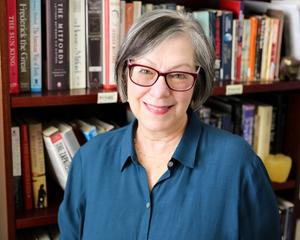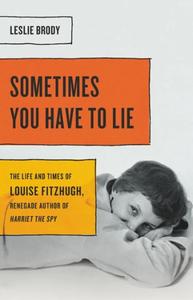
|
|
| photo: Emily Tucker | |
Leslie Brody is an author and professor of English and Creative Writing at the University of Redlands in California. Her books include Irrepressible: The Life and Times of Jessica Mitford, and the memoir Red Star Sister, which won a PEN USA Creative Nonfiction Award. Her latest book is Sometimes You Have to Lie: The Life and Times of Louise Fitzhugh, Renegade Author of Harriet the Spy, available now from Seal Press/Hachette.
On your nightstand now:
Anne Moody's Coming of Age in Mississippi, Emma Goldman's Living My Life, A Chill in the Air by Iris Origo. I am writing this in the midst of the pandemic in October 2020, in California where wildfires rage and where the chill in the air portends a frazzling democracy. The nonfiction books I'm reading are about resisting fascism. I admire Moody and Goldman for their great minds and courage under stress. Also, in the pile are novels by authors known for charm and wit and a touch of malice, Loitering with Intent by Muriel Spark, The Offshore by Penelope Fitzgerald and I'll Be Leaving You Always by Sandra Scoppettone.
Favorite books when you were a child:
Book of Nonsense by Edward Lear, Alice in Wonderland by Lewis Carroll and The Red Fairy Book from the Andrew Lang collected fairy tales series. I particularly loved the story of the 12 Dancing Princesses, which ends "Nous n'irons plus au bois, Les lauriers sont coupes." This list makes me sound like a little Victorian. Perhaps I wished to be--but by 10 or 11, I was tearing through the complete works of Edgar Rice Burroughs.
Your top five (seven) authors:
Muriel Spark, Jane Austen, Dorothy Sayers, Paule Marshall, Virginia Woolf, Henry James, Shakespeare.
Book you've faked reading:
Moby-Dick. When I was younger, I hated the idea of books that were primarily about manly occupations, and/or hunting wild animals. If in a book I was reading, there was an elephant or a whale anywhere within the vicinity of a human I'd have a conniption fit. I much preferred books about animals that talked, and I haven't changed much, really. I confess I've gone to great lengths to avoid reading Moby-Dick. For instance, while studying for my Ph.D., instead of doing 19th-century American literature, I read world lit and discovered many wonderful Caribbean authors like Derek Walcott, Jamaica Kincaid and Jean Rhys. So, thank you, Herman Melville. By the way, I understand it's great.
 Book you're an evangelist for:
Book you're an evangelist for:
Footsteps: Adventures of a Romantic Biographer by Richard Holmes. Holmes takes similar journeys to those of several 19th-century travelers, writers and thinkers like Robert Louis Stevenson and Mary Wollstonecraft; writing of their stories as his own unfold. I can't think of a better book than Footsteps for capturing youth and early ardent devotion in both author and (multiple) subjects. I love the way Holmes comes to recognize how submerged he is in his work when one day he dates a check 1772, instead of 1972. Also, The Norton Book of Women's Lives by Phyllis Rose and On Writing Well by William Zinsser.
Book you've bought for the cover:
Spring Fire by Vin Packer (Marijane Meaker). I have a fondness for 1950s pulp design. The original cover of Spring Fire, published in 1952, shows two sorority girls dressed in lingerie. The blonde in a black slip looks off into the distance, while the brunette with her modest, downturned eyes wears red. An orangey-red background matches the lipstick on both girls' pillowy lips. Under the title, crawling in black Courier font across one nude shoulder are the words: "A story once told in whispers/ Now, frankly, honestly written."
Book you hid from your parents:
We were a reading family. My mother died when I was 14, and my father worked long days to keep body and soul together, so he left me quite alone to develop my independent reading habits. I did once get chided by my aunt who told me that I was too young to read her copy of Valley of the Dolls, the sensational melodrama by Jacqueline Susann. Of course, I read it anyway. I vaguely remember mentions of booze, pills and some '60s sexy talk, but what stayed with me was the breathless page-turning style. I've always been fascinated by page turners.
Books that changed your life:
Hons and Rebels by Jessica Mitford; Pride and Prejudice by you know who; Collected Poems of William Butler Yeats; Their Eyes Were Watching God by Zora Neale Hurston; La Vagabonde by Colette; The Oblivion Seekers and Other Stories by Isabelle Eberhardt; Death of the Heart by Elizabeth Bowen; Slouching Towards Bethlehem by Joan Didion; Sylvia Plath's Ariel; The Golden Notebook by Doris Lessing; The Diaries of Anaïs Nin; Brown Girl, Brownstones by Paule Marshall; The Autobiography of Malcolm X; Gravity's Rainbow by Thomas Pynchon. Maybe you can tell I'm a child of the Sixties?
Favorite lines from books:
"But the effect of her being on those around her was incalculably diffusive: for the growing good of the world is partly dependent on unhistoric acts; and that things are not so ill with you and me as they might have been is half owing to the number who lived faithfully a hidden life, and rest in unvisited tombs." From Middlemarch by George Eliot
And:
"I refuse, I absolutely refuse to be an onion." From Harriet the Spy by Louise Fitzhugh
Five (six) books you'll never part with:
I love these books for different reasons. They've all delighted me in style and content. And when I return to them, I always find something new.
Voltaire in Love by Nancy Mitford
Daisy Bates in the Desert by Julia Blackburn
By Night in Chile by Roberto Bolaño
Mrs. Dalloway by Virginia Woolf
The Woman Warrior by Maxine Hong Kingston
The Autobiography of Alice B. Toklas by Gertrude Stein

